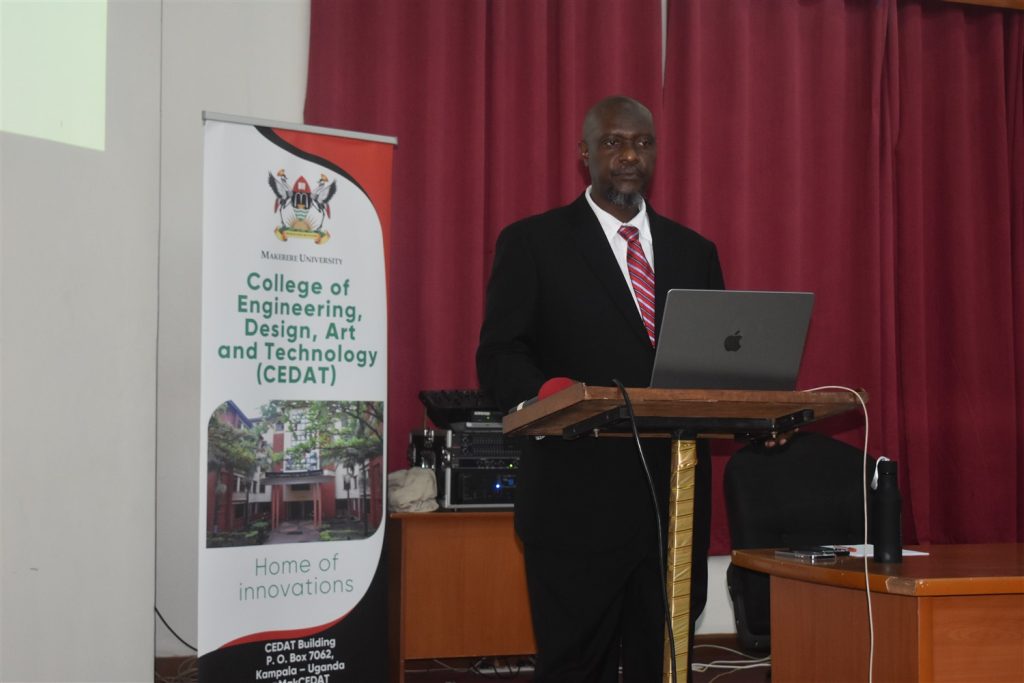
Dr. Ismail Kimuli successfully defended his PhD on Tuesday 11th July 2023 at an event that was both physical in the CEDAT Conference room and virtual.
His success attracted a lot of congratulatory messages from the faculty and staff at the College of Engineering, Design, Art and Technology (CEDAT) that included the Dean School of Engineering Assoc. Prof. Dorothy Okello who was also the session chair for the Ph.D. public defence session.
In her remarks Assoc. Prof. Dorothy Okello extended her congratulatory message to the candidate for successfully defending his work. She commended the supervisors that included Prof. John Baptist Kirabira and Dr. Michael Lubwama from the Mechanical Engineering Department for their contribution in enabling the candidate deliver as expected.
Dr. Kimuli’s Thesis was titled Development of a Sustainable Low-Carbon Footprint for the Greater Kampala Metropolitan Area Towards the Mid- Century.
ABSTRACT
With a resolute economy, commercialization, urbanization, and industrialization, the Greater Kampala Metropolitan Area (GKMA) faces increasing pressures to raise electricity in the energy balance and abate CO2 emissions. However, GKMA does not have a focused energy policy framework. Additionally, there are growing concerns about anthropogenic interference with the climate leading to global warming, mainly from energy activities that support economic growth. Economies across the world are addressing this challenge through the development of sustainable low-carbon footprints.
The main objective of this study was to develop a comprehensive framework for analyzing energy impacts and macroeconomic effects of low-carbon scenarios for the determination of a sustainable pathway toward 2050 for the GKMA. The study used a TIMES/CGE hybrid framework to address the knowledge gap in 4 scenarios namely: 1) Business as usual as the baseline; 2) Kabejja (with a 20% CO2 abatement policy); 3) Carbon-Tax (100$/ton by 2050), and 4) Lutta (95% CO2 abatement policy).
Results show that if the current policy settings demonstrated in BAU continue up to 2050, energy consumption would increase from 139.6 PJ to 469.35 PJ; CO2 emissions will increase from 4.6 mtns to 7 mtns. However, energy demand would decrease by: Kabejja:2.3%; Carbon-Tax:3.4%, and Lutta:3.3% as compared to BAU. CO2 emissions would decrease by: Kabejja:8.6%, Carbon-Tax:55.14%, and Lutta:60% by sector as compared to BAU. The equivalent variation (EV) in household welfare would increase by Kabejja:3.3%, Carbon-Tax:3.6%, and Lutta:13.7% as compared to BAU. The energy intensity of GDP would decrease by Kabejja:1.1%, Carbon-Tax:1.5%, and Lutta:7.8% as compared to BAU. The economy would shift gradually towards Lutta with a decrease in the CO2 emissions intensity of GDP of 60.6% by 2050. Transportation, Industrial, and Residential sectors are the greatest emitters of CO2 by sector, in all scenarios and thus need policy interventions to realize deep CO2 emissions reductions.
A sustainable low-carbon footprint for the GKMA by 2050 is feasible provided 53.68% of energy demand by fuel type is low-carbon electricity, the total primary energy supply is diversified and optimized, and the setting up of an electrified Kampala metro becomes the central focus for policy changes over the planning period. Lutta is the sustainable pathway to a low-carbon footprint for the GKMA towards 2050. The study’s major recommendation to the metropolis is to adopt the low-carbon electrification of the GKMA energy policy.
Keywords: GKMA; TIMES/CGE hybrid modeling; Sustainability; Scenario Planning; Low-carbon Development; Energy Planning &Management
